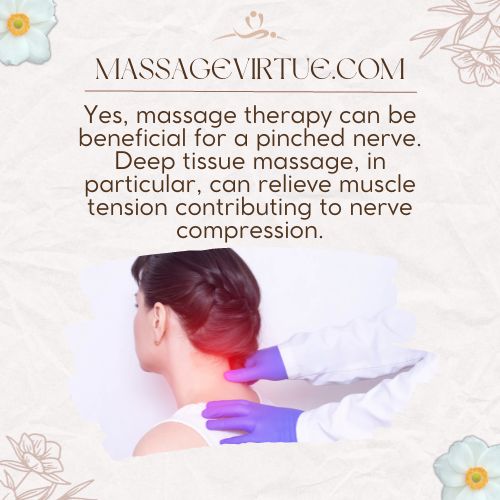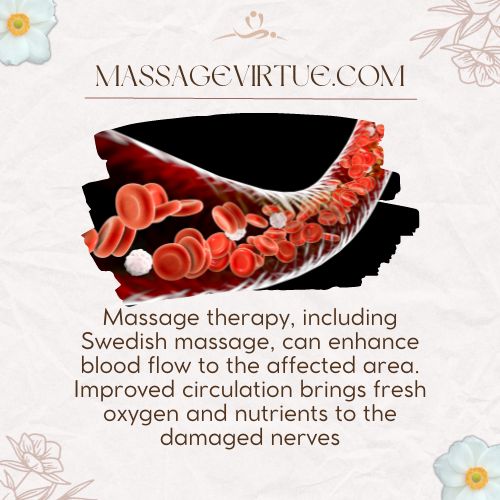If you’re one of the countless individuals experiencing the discomfort and agony of a pinched nerve, you’re well aware of the relentless pain it can bring.
The good news is that relief may be closer than you think.
In this comprehensive guide, we’ll explore the potential benefits of massage therapy in alleviating pinched nerve pain. Let’s dive right in.
Can Massage Help Pinched Nerve?
Yes, massage therapy can be beneficial for a pinched nerve. Deep tissue massage, in particular, can relieve muscle tension contributing to nerve compression.
It enhances circulation and reduces inflammation, potentially alleviating pain.

However, consult your healthcare provider first to determine if it’s suitable for your specific condition and its severity. A skilled massage therapist should be chosen to ensure a tailored approach.
Remember that massage is typically a complementary therapy and may not completely eliminate the root cause of the pinched nerve.
What is the Pinched Nerve?
Before we explore the world of massage therapy, it’s essential to understand what a pinched nerve is. A pinched nerve occurs when excessive pressure is applied to a nerve by surrounding tissues, such as bones, muscles, or tendons.
This pressure can disrupt the nerve’s function and lead to pain, tingling, numbness, or weakness in the affected area.
Common Symptoms of Pinched Nerves
- Sharp or Radiating Pain: Pinched nerves often manifest as sharp, shooting pain that radiates along the nerve’s path.
- Tingling and Numbness: You may experience a “pins and needles” sensation or numbness in the affected area.
- Muscle Weakness: Weakness in muscles controlled by the pinched nerve can occur, affecting your range of motion.
- Burning Sensation: Some individuals report a burning sensation at the site of the pinched nerve.
- Increased Muscle Tension: Muscle tension and spasms can also be common.
The Benefits of Massage Therapy for Pinched Nerve Pain
Now that we’ve established what a pinched nerve is and the symptoms it can cause, let’s explore how massage therapy can play a crucial role in relieving this discomfort.
1. Alleviates Muscle Tension and Spasms
Massage therapy, particularly deep tissue massage, is highly effective in releasing muscle tension and reducing spasms.
When a pinched nerve is caused by muscle constriction, a skilled massage therapist can target these tense areas and help them relax, alleviating the pressure on the affected nerve.
2. Promotes Circulation
Good circulation is essential for the healing process.

Massage therapy, including Swedish massage, can enhance blood flow to the affected area.
Improved circulation brings fresh oxygen and nutrients to the damaged nerves, aiding in their recovery.
3. Reduces Inflammation
Inflammation often accompanies pinched nerves and contributes to the pain and discomfort.
Massage can help reduce inflammation by stimulating the lymphatic system, which plays a crucial role in eliminating waste and toxins from the body.
4. Encourages Pain Relief
One of the primary goals of massage therapy is pain relief. Skilled therapists can target the source of your pain and work to alleviate it.
This provides much-needed relief from the symptoms of a pinched nerve.
Which Type of Massage is Good for Pinched Nerves?
Now let’s explore some specific massage techniques that can help relieve pinched nerve pain:
| Massage | Description |
| Deep Tissue Massage | Targets the deep layers of muscle and connective tissue to release tension and promote muscle relaxation. Ideal for pinched nerves caused by muscle constriction. |
| Swedish Massage | Utilizes long, flowing strokes and gentle kneading to enhance circulation and reduce muscle tension. Effective for overall relaxation and pain relief. |
Before You Book Your Massage
Before you rush to book a massage therapy session to alleviate your pinched nerve pain, there are a few crucial points to consider:
1. Consult Your Healthcare Provider: It’s essential to consult with your healthcare provider or a qualified medical professional to determine the cause and severity of your pinched nerve.
2. Choose a Skilled Massage Therapist: Ensure that your massage therapist is experienced and trained in addressing pinched nerve issues. They should be aware of your condition and tailor their approach accordingly.
3. Communicate Openly: During your massage session, communicate any discomfort or pain you may experience. Your therapist can adjust their techniques to ensure your comfort and safety.
4. Be Patient: Relief from pinched nerve pain may not be immediate. It may take multiple sessions to achieve the desired results, so be patient and consistent with your therapy.
Conclusion
In summary, massage therapy can be a valuable complementary approach to alleviate pinched nerve pain.
By targeting muscle tension, improving circulation, reducing inflammation, and encouraging pain relief, massage can play a crucial role in your journey toward a pain-free life.
FAQs
What Kind of Massage is Best for Pinched Nerve?
Deep tissue massage is often the most effective for a pinched nerve. It targets deep muscle layers, which can alleviate the tension causing nerve compression.
Is it OK to Get a Massage with a Pinched Nerve?
In most cases, yes, but consult a healthcare provider first to ensure it’s safe given the cause and severity of your pinched nerve.
Can Deep Tissue Massage Fix Pinched Nerve?
Deep tissue massage can help relieve pinched nerve pain, especially if it’s due to muscle tension.
However, results may vary based on the individual and the underlying cause.
Can Nerve Pain Be Massaged Away?
Massage can manage nerve pain symptoms by reducing muscle tension, improving circulation, and promoting relaxation. But it doesn’t eliminate the root cause.
How Do You Release a Pinched Nerve?
Consult a healthcare provider, consider physical therapy, massage therapy for muscle tension, medications, maintain good posture, and, if needed, surgery (in severe cases).
Always seek professional guidance tailored to your condition.


